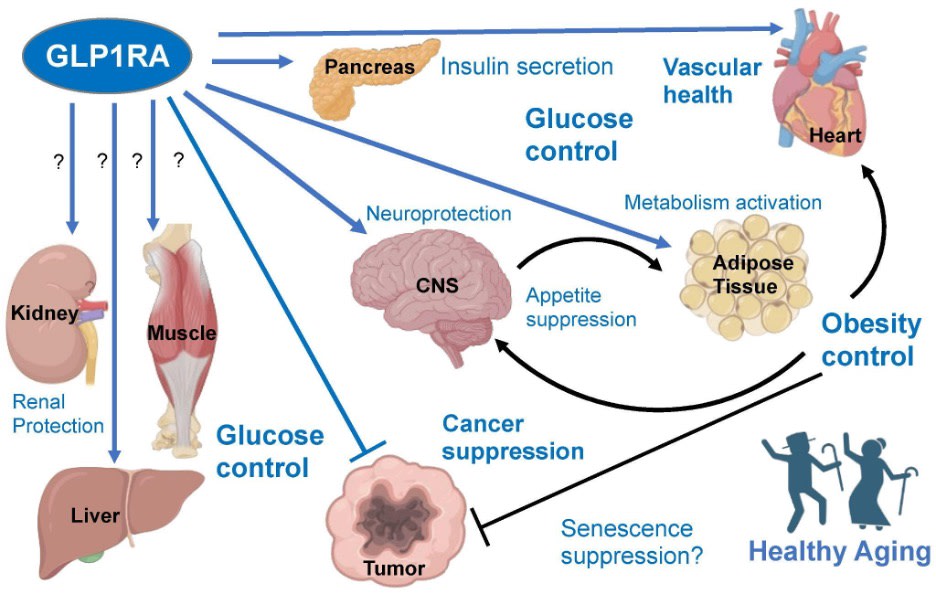Table of Contents
II. Understanding the Side Effects of Rybelsus
III. Managing Rybelsus Side Effects
Rybelsus is a popular medication prescribed for the management of type 2 diabetes, and it’s provided a significant development in how the condition can be treated. Taken orally, Rybelsus offers a practical alternative to the injectable forms of diabetes treatment, making it an easier option for patients. But, as with any medication, understanding the side effects of Rybelsus is crucial to ensure its safe use.
In this article, we’ll explore Rybelsus in detail and outline the common and more serious side effects of the medication, aiming to give current and potential Rybelsus users the knowledge they need to manage their diabetes safely and optimally long-term.
Quick Takeaways:
- Rybelsus is an oral medication for type 2 diabetes that provides an easier alternative for patients to injectable treatment.
- Understanding both common and serious side effects of Rybelsus is essential for safe use and optimal diabetes management.
- Common side effects like nausea and stomach pain can often be managed through dietary adjustments and staying hydrated.
- Immediate medical attention is required for more serious side effects such as pancreatitis or severe hypoglycemia.
- Effective management of Rybelsus side effects involves staying hydrated, making dietary adjustments, exercising regularly, mindfully eating, and consulting healthcare providers as needed.
Rybelsus: A Quick Overview
Rybelsus (active ingredient semaglutide) represents an important advancement in how type 2 diabetes is treated and managed. Semaglutide belongs to a medication class called GLP-1 receptor agonists. It works by mimicking the action of the GLP-1 hormone, which is naturally produced in the body after eating.
This hormone plays a crucial role in blood sugar regulation by stimulating insulin production, reducing the amount of glucose produced by the liver, and slowing down gastric emptying. This collectively helps to lower blood sugar levels and manage type 2 diabetes more effectively over time.
In addition to glucose control, GLP-1 receptor agonists deliver additional health benefits that include: promoting cardiovascular health, reducing risks surrounding neurodegeneration and certain cancers, and aiding in weight loss.

One of the key reasons Rybelsus is prescribed over other diabetes medications is its oral administration. Unlike many GLP-1 receptor agonists that require injections, Rybelsus's tablet form offers easier use, which can significantly improve patient adherence to medication schedules and treatment satisfaction.
These factors, combined with its effective glycemic control, make Rybelsus a preferred option for many healthcare providers and patients looking for an efficient, user-friendly diabetes management solution.
Understanding the Side Effects of Rybelsus
Like all medications, Rybelsus comes with potential side effects that users must be aware of. Knowing these side effects is crucial for managing expectations and ensuring the medication’s safe use. Common and serious side effects are outlined below.
Common Side Effects of Rybelsus
Rybelsus users may experience a range of common side effects. While generally not life-threatening, they can affect daily life and overall well-being. These include:
- Nausea: A frequent side effect at the beginning of treatment that tends to decrease over time.
- Stomach pain and indigestion: Discomfort in the abdominal area, which can sometimes be alleviated by eating smaller, more frequent meals.
- Loss of appetite: This may lead to weight loss, as patients feel less inclined to eat.
- Constipation and diarrhea: Changes in bowel movements, which can usually be managed with dietary adjustments.
- Fatigue: Feelings of tiredness or lack of energy, which may affect daily activities.
Understanding and actively managing these common side effects are key steps in maintaining quality of life while on Rybelsus, and open communication with healthcare providers can ensure the best strategies are in place to mitigate them.
Serious Side Effects of Rybelsus
While less common, there are serious side effects associated with Rybelsus that require immediate medical attention:
- Pancreatitis: Severe abdominal pain that may radiate to the back, accompanied by nausea and vomiting. This condition can be life-threatening and requires prompt medical intervention.
- Diabetic retinopathy complications: Worsening or new onset of diabetic eye disease can occur, necessitating regular eye examinations.
- Kidney problems: Changes in urination frequency, swelling in the feet or ankles, and fatigue can indicate kidney issues.
- Severe hypoglycemia: When used with other diabetes medications like insulin, Rybelsus can cause low blood sugar levels, characterized by dizziness, confusion, and even loss of consciousness.
If you experience symptoms of any of these serious side effects, it's imperative to seek medical help immediately. Early detection and treatment can mitigate the risks associated with these conditions and ensure continued health and safety while managing your diabetes.
Managing Rybelsus Side Effects
Managing the side effects of Rybelsus effectively can enhance treatment adherence and improve overall quality of life for those with type 2 diabetes. Here are some strategies to manage and mitigate common side effects:
Quick Tips for Reducing Symptoms
- Stay Hydrated: Increasing fluid intake can help alleviate nausea and prevent dehydration caused by diarrhea.
- Adjust Your Diet: Eating smaller, more frequent meals can help manage stomach pain and indigestion. Including fiber-rich foods in your diet can alleviate constipation, while avoiding foods that are too rich, spicy, or fatty may reduce nausea.
- Exercise Regularly: Light to moderate exercise, as recommended by a healthcare provider, can improve digestion and reduce fatigue.
- Eat Mindfully: Paying attention to what and how you eat can reduce gastrointestinal side effects. Slow down your eating and ensure you're in a relaxed environment.
- Monitor Blood Sugar Levels: For those experiencing fatigue, regularly monitoring your blood sugar levels can help manage energy dips effectively.
When to Consult a Healthcare Provider
It's crucial to communicate with your healthcare provider if side effects persist or worsen or if you experience severe symptoms like persistent vomiting, severe abdominal pain, or signs of dehydration. They may adjust your dosage or recommend alternative treatments.
By implementing these strategies and maintaining open communication with your healthcare team, you can more comfortably navigate Rybelsus's side effects and continue your journey toward effective diabetes management.
Putting It All Together
Rybelsus offers individuals with type 2 diabetes a convenient and effective option for managing their blood sugar levels. Its oral form and the range of benefits beyond blood sugar control, such as potential cardiovascular health improvements and weight loss support, make it a compelling choice for many.
However, like all medications, it's essential to be aware of and understand how to manage its side effects to ensure the best possible outcomes. Whether you're currently using Rybelsus or considering it as a part of your diabetes management plan, remember that knowledge is key to navigating treatment.
Understanding the common and serious side effects, coupled with proactive management strategies, can help you maintain your quality of life and achieve your health goals.
If you’re looking for a safe, affordable, and convenient way to access your Rybelsus prescription, My Drug Center can help.
Learn more here about how we can help you save on your next Rybelsus order.
The information in the article is not meant to be used for treatment or diagnosis. It is designed for general awareness and for information purposes only. Always consult a medical professional for your specific healthcare needs.
